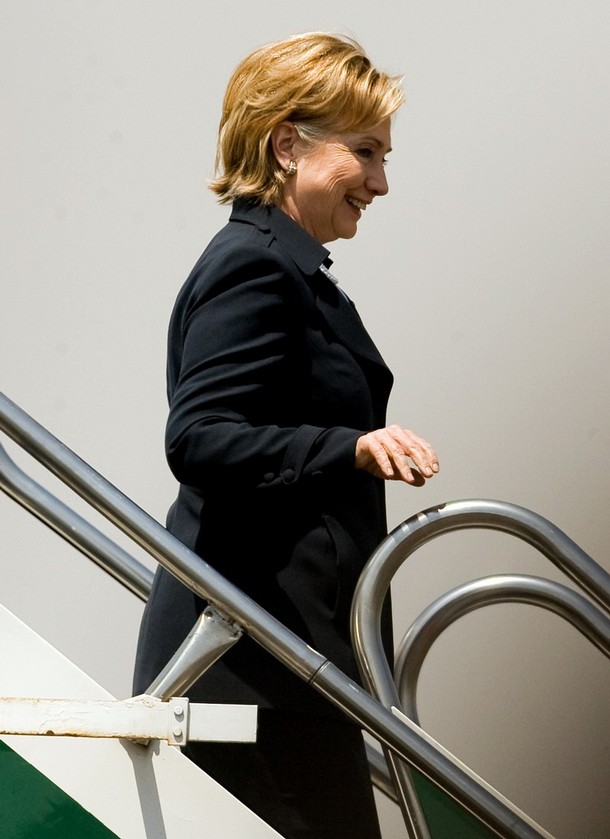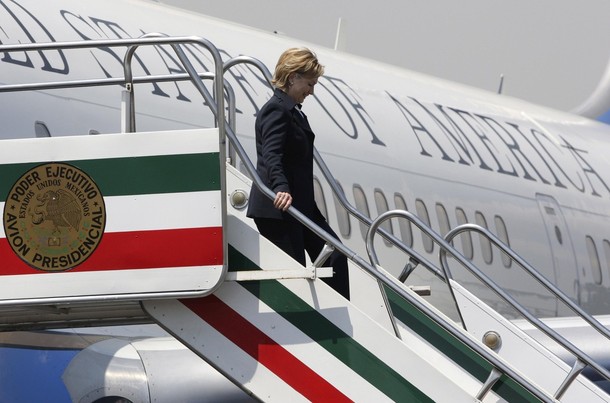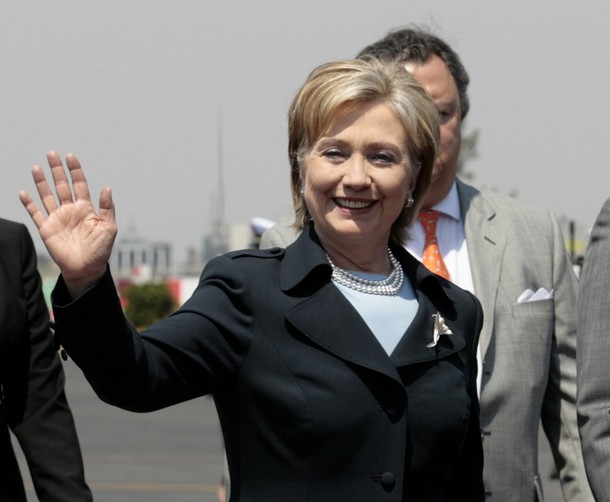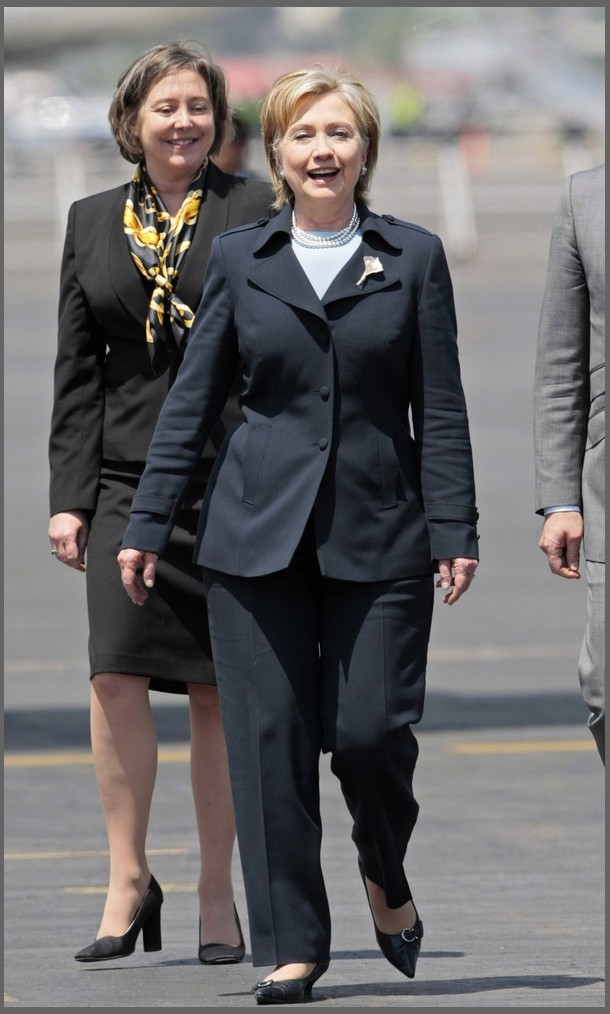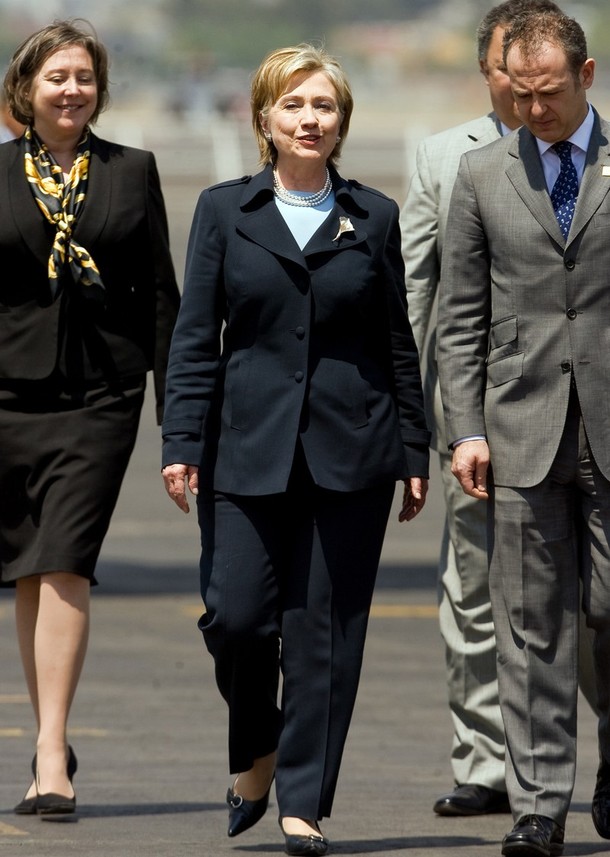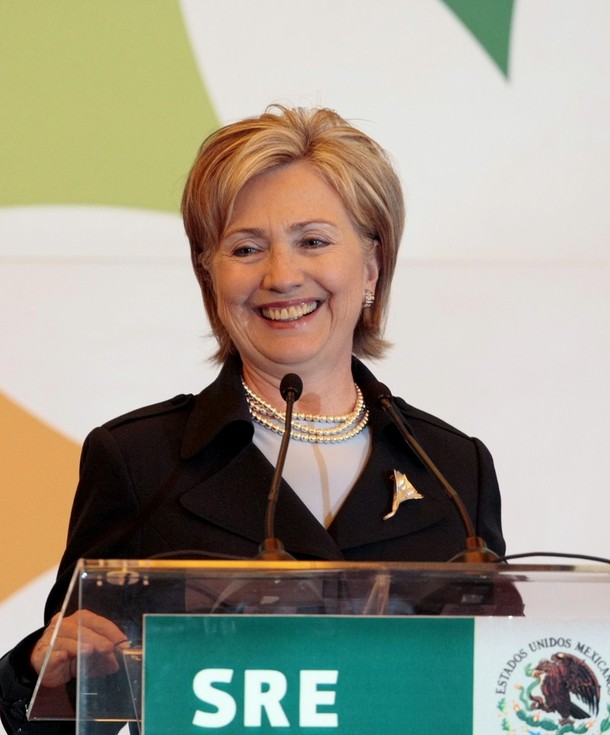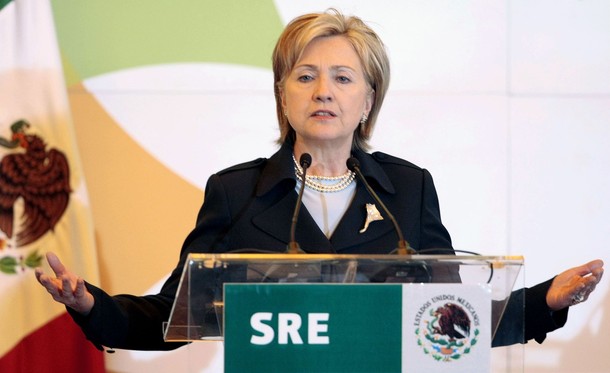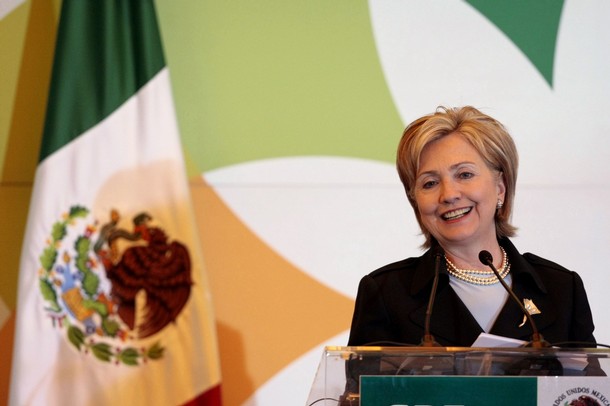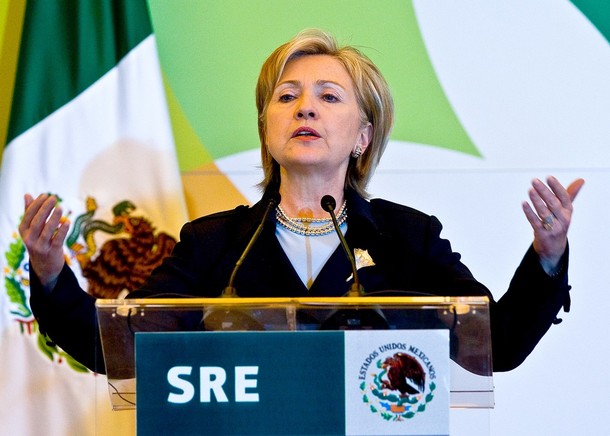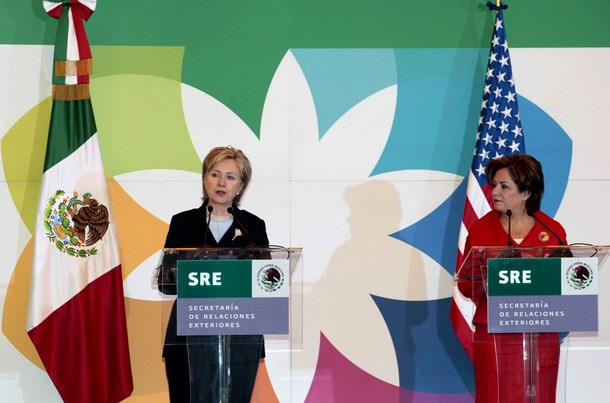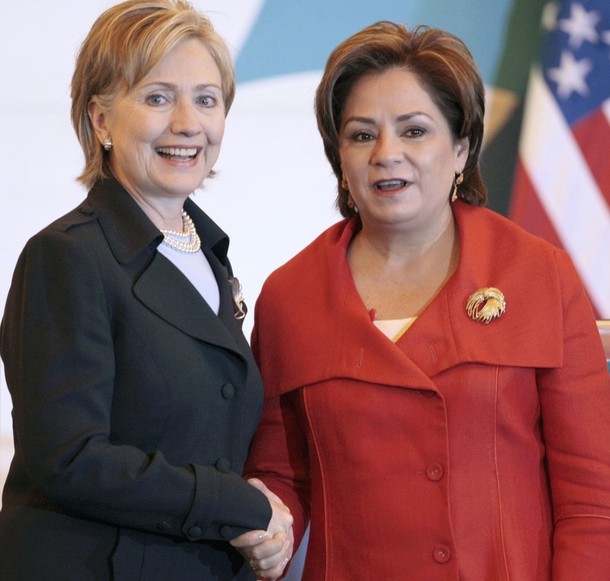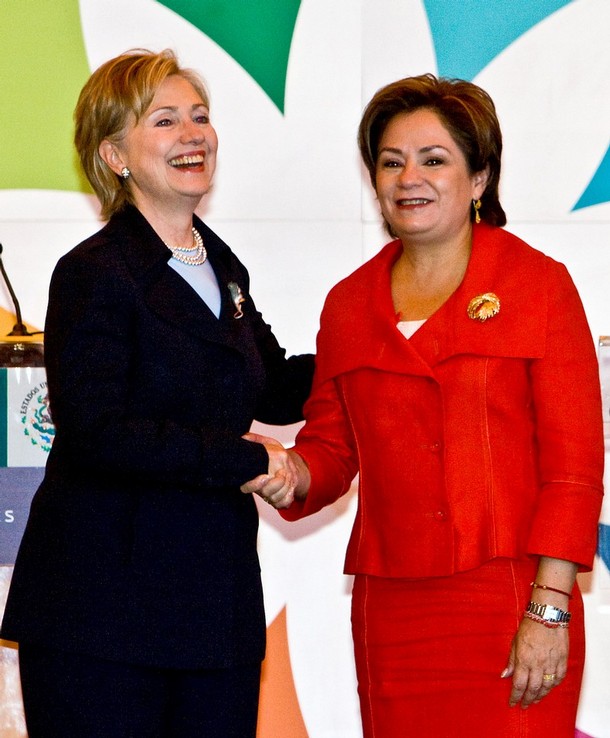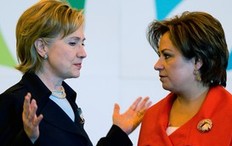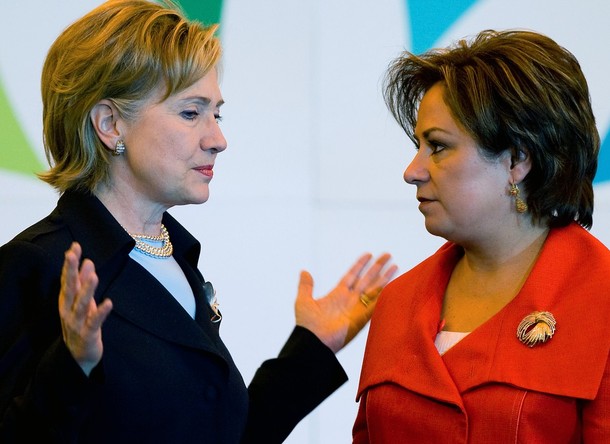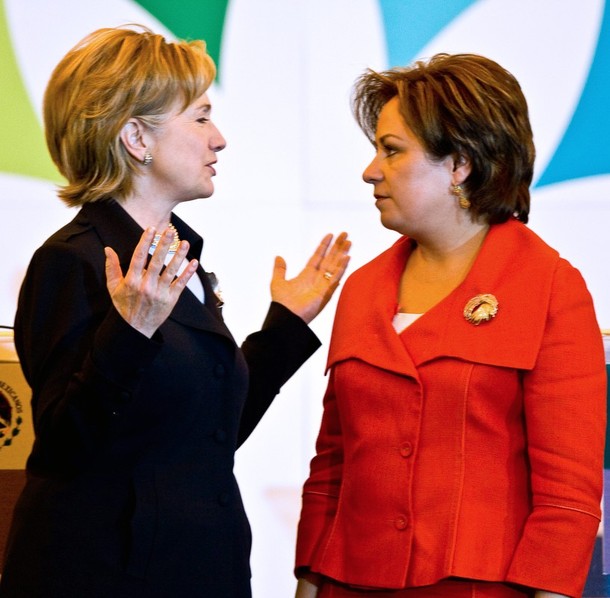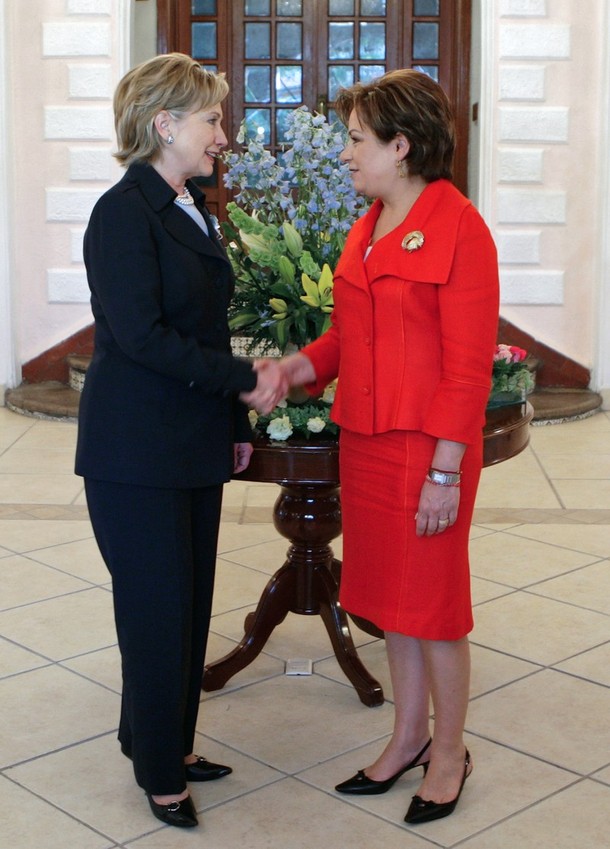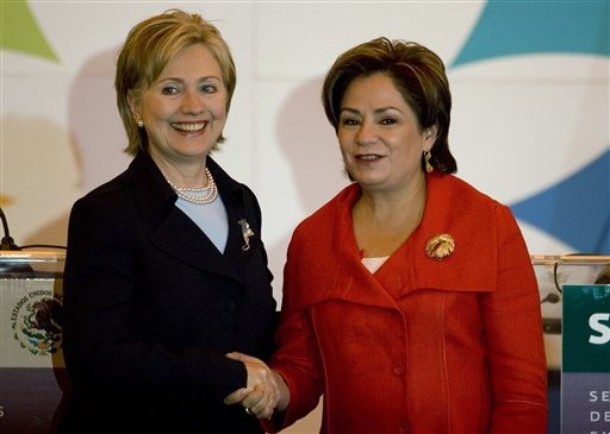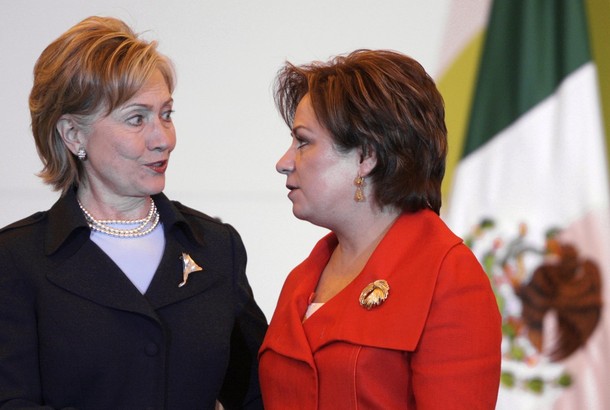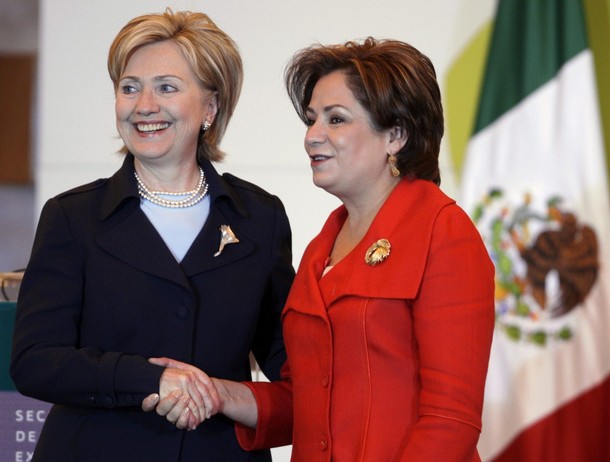Remarks With Mexican Foreign Secretary Patricia Espinosa After Their Meeting
Remarks
Hillary Rodham Clinton
Secretary of State
Mexico City, Mexico
MODERATOR:
(via interpreter.) Good afternoon to all of you. We have here with us
today State Secretary of the United States, Mrs. Hillary Clinton, and
the (inaudible) First Ministry of Mexico, Ambassador Patricia Espinosa.
Both will be conveying an initial message right now, and then after that
we shall go into the question-answer period.
FOREIGN MINISTER ESPINOSA:
(via interpreter.) Good afternoon, friends, and the media. Before
anything else, I would like to thank, in a very special fashion, State
Secretary Hillary Clinton, for having accepted my invitation to visit
Mexico. I welcome the fact that this is a meeting taking place a few
weeks after she took office, Department of State of the United States.
Your
presence in Mexico has a special importance, since this is the first
trip to Latin America, a little before President Barack Obama will also
be visiting Mexico. After a very intense agenda of activities in Mexico
City today, Secretary Clinton will be traveling tomorrow to the city of
Monterrey, where she -- where I will be having the pleasure of being
with her. And I would also like to say that, as you know, today
Secretary Clinton has made a courtesy visit to President Calderon, where
they discussed multiple topics of the bilateral agendas; for instance,
migration, trade, competitiveness, border development, and security. It
was truly an extremely fruitful conversation; a very interesting
conversation they held, and that’s the reason for our being delayed a
few minutes. And we would like to thank you for your understanding, and
thank you also for being here to be with us in this press conference.
In
the dialogue we held this morning with Secretary Clinton, we have
coincided on the importance of the topic related to migration, and we’ve
also coincided that this is a key issue that unites our two countries.
We are going to be working together. We’re going to be working together
in the following years so that the migration phenomenon may be a
phenomenon that will be benefiting both of our nations.
In
highlighting our full respect for the United States legislation and the
sovereign process of that country and the legislative process of that
country, I told Secretary Clinton the concern of the Mexican Government
due to the situation that our co-nationals are facing in the United
States. And I also highlighted the importance that we give the legal
framework of migration issues so that it will respond to the migration
reality and the need to change the climate that Mexicans now live in the
United States.
The bilateral agenda between Mexico and the
United States is a very broad agenda, and in them, the economic issues
have, of course, particular importance, especially today in this context
of economic crisis at the international level. We’ve coincided as well
in this environment on the need of concentrating our efforts on being
able to have our regional competitiveness increase as a means to promote
the well being of our respective countries. Here, I also wanted to
highlight the will to work together, to work together so that we can
accomplish conditions that will allow for the full compliance,
commitment that we have taken upon ourselves in NAFTA, as countries of
NAFTA, with certainty in each one of the different provisions, including
the topic related to motor transportation. The border has been a key
aspect, a key issue in our conversations. We’ve also expressed our
willingness to invest with determination on border infrastructure in
short, medium term, so that we can integrate, and thus be able to turn
the border into a pull for competitiveness, to increase competitiveness
between our two countries.
We also talked about the importance
of cooperation and the maturity we have been able to get in our fight
against organized crime, as well as the convenience and the importance
of continuing, and in a more profound manner, the implementation of the
Merida Initiative. We have said that the high-ranking level group of the
Initiative that met for the first time in Washington last year will be
holding this year as well another working session, if possible, if the
agenda so allows it, with all the participants here in our country. And
the different working groups, the coordination groups that are working
on security issues, the groups we’ve been able to create greatly reflect
the bilateral character of our focus based on the principle of
co-responsibility. And later on, in a working session with the
attendants in this Foreign Ministry and some members of the cabinet in
terms of security issues, we’re going to go into a greater detailed
discussion on this.
We also had the opportunity of talking
about the world situation and we coincided on the role that our
countries are now called to play in the multilateral fora in a
particular manner, in the United Nations, and, of course, especially
also now during our membership in the Security Council of the United
Nations as non-permanent members.
And we also spoke about the
participation of Mexico in the relevant fora; for instance, the case of
G-20 and the G-8, G-5 dialogue. And in this sense, we also agreed to
continue increasing our collaboration and dialogue within the framework
of those fora. And Secretary Clinton will continue with a very intense
agenda that shows her interests for Mexico, and the very broad gambit of
issues that unite our two countries, in terms of education, for
instance, culture, social development issues, entrepreneurial and the
environment, of course.
This visit is and has been a -- it is,
today, although she will still be with us in Mexico for approximately
24 more hours, a little bit over 24 more hours -- but it has already
been, this visit, a very successful visit. And let me also say that the
Governments of President Calderon and President Obama will coincide in
the following four years, and that is why both governments, both
administrations are determined to consolidate our relationship as a
true, true partnership at the strategic level, a strategic partnership.
I
would now like to give the floor to State Secretary Hillary Clinton,
who does not require really any type of introduction, because she is one
of the most important women of the political life of the United States,
and also a very close friend of Mexico. Mrs. Clinton, you have the
floor. Muchos Gracias.
SECRETARY CLINTON: Thank you
very much, Secretary Espinosa. I appreciate that kind introduction, and
I’m also grateful for your invitation to visit Mexico for my first stop
in Latin America as Secretary of State.
The Secretary and I
had a very productive conversation about a broad range of issues. As she
has just described, we are looking forward to working together in the
months ahead on many of these issues on behalf of our presidents and our
countries.
President Calderon has demonstrated great courage
and dedication in working to shape the future of our continent and our
hemisphere. And I bring greetings from President Obama, who looks
forward to coming himself to Mexico in just a few weeks time.
Our
two nations know each other very well, and with good reason. This is
one of the most important relationships that exists between any two
countries in the world. We are part of the same family, we share this
continent as our common home, and we will inhabit a common future. That
is why the United States and Mexico need a strong and sustained
partnership, one based on comprehensive engagement, greater balance,
shared responsibility, and joint efforts to address hemispheric and
global issues.
We need such a comprehensive agenda in order to
make progress on the economy, on energy and climate change, on
security, immigration, education, health, and other areas that are of
great importance to our two countries and our two peoples. During this
trip, we will be discussing many of these topics. And I am pleased to
announce several measures that will help strengthen our partnership with
Mexico and move us both closer to our shared goals.
First,
the global financial crisis has reinforced how closely our economies are
linked. If there was any doubt before, there should be none now. We
rise and fall together. We know that commerce between our nations is and
will be a crucial part of our economic recovery. I want to thank
President Calderon, Secretary Espinosa, and the Government of Mexico for
the important role that you are playing in helping to shape the G-20
agenda.
In order to facilitate legal trade and travel between
our nations, the Administration has set aside $720 million dollars for
modernizing border crossings. That money will help encourage commerce
and travel by making the gateways between our countries more efficient.
I also want to speak to the issue of security.
Now,
our relationship is much bigger than any issue, including this one. Yet
the criminals and kingpins spreading violence are trying to corrode the
foundations of law, order, friendship, and trust between us and that
support our continent. They will fail. With bold leadership from
President Calderon, we are working together to provide the people of our
nations with the security they deserve. Under the Merida Initiative, a
program conceived by Mexico and embraced by the United States, we have
now committed hundreds of millions of dollars to training and equipping
Mexican law enforcement, and strengthening Mexico’s judicial system and
democratic institutions.
Part of being a good partner is
being a good listener. The Mexican Government made clear to us its
urgent need for additional helicopters to take on the drug traffickers,
and we are responding. And I am pleased to announce that the Obama
Administration, working closely with Congress, intends to provide more
than $80 million in urgently needed funding for Blackhawk helicopters
for Mexican law enforcement. These aircraft will help Mexican police
respond aggressively and successfully to the threats coming from the
cartels.
We are also announcing the creation of a new
bilateral implementation office here in Mexico, where Mexican and U.S.
officials will work together, side-by-side, to fight the drug
traffickers and the violence which they spread. We realize that drug
trafficking is a shared problem. I have discussed with the Secretary and
with the President what the United States can do to reduce the demand
for drugs in our own country, and to stop the flow of illegal guns
across our border to Mexico. And I reported to them on the major steps
that our government announced yesterday.
Coming to Mexico
soon will be Secretary Napolitano and Attorney General Holder to discuss
in greater detail what we will do to reduce gun smuggling from the
United States to Mexico, and other measures including equipment and
surveillance that will help address violence on both sides of the
border.
We are confident that with the courageous efforts
undertaken by President Calderon, the Government of Mexico, the military
and police of Mexico, and the people of Mexico that the efforts
undertaken to strengthen this country’s response, to stamp out
corruption, to build strong intuitions, will succeed. And we will stand
shoulder-to-shoulder with you as you undertake all of these actions.
Even
as we focus on these urgent challenges, let us not forget that our
relationship is far greater than any threat, and that our people share
an unshakable bond. Mexico has supported the United States at many
critical moments in our own history. I will never forget, and I want to
thank the Government of Mexico and the people of Mexico, for the help
you gave us after Katrina. The Mexican army was there to help provide
food and support to people who had been evacuated from that terrible
natural disaster.
I thank you for the help that you give on a
regular basis, with wildfires in California or tornado damage or
flooding in Texas. We have an ongoing, absolutely important, unbreakable
bond, and that’s what I want to reiterate today.
This is a
significant moment in the history of our continent. Yes, we do face many
serious challenges, and we can’t just talk about them; we must act to
meet them. But this is a moment of great opportunity. Tomorrow, I will
be visiting a state-of-the-art clean energy plant in Monterrey, a plant
that, frankly, is more advanced than most, if not all, of the plants we
have in the United States. I will be witnessing the signing of
agreements between the University of Texas and Universities here in
Mexico to further and deepen our energy partnership. I will be meeting
with indigenous students who are part of exchange programs here in
Mexico, with families and institutions in the United States. So let us
build on this cooperation, on comprehensive engagement, balance, and,
yes, shared responsibility for a new century of cooperation and progress
together that will unleash the boundless potential of the people of
Mexico and the United States.
Thank you so much, Madame Secretary.
MODERATOR: (In Spanish.)
QUESTION: Madame
Secretary, I’m going to ask several questions made by the press here,
so I would just ask you to bear with me. First of all would be President
Obama said yesterday that if the plan to secure the border fails, the
U.S. is ready to take further steps. What are these further steps? Does
that include a militarization of the border, or even a U.S. military
presence in Mexico? That would be the first.
The second would
be will the U.S. take any steps to prohibit the sales of automatic
weapons to other countries, and is the Obama Administration ready to
tackle the second amendment in the U.S.?
And finally, the
third question would be about the helicopters. The Mexican Government
has actually bought helicopters in France because of the delays faced
with the Foreign Military Sales Program. Could you elaborate on that?
And
finally – (laughter). Sorry, a lot of questions. The Department of
Defense announced that it’s going to help the Mexican Department of
Defense with $13 U.S. million dollars to liberate areas controlled by
drug trafficking corporations here in Mexico. Do you believe that parts
of Mexico are under control of the drug trafficking organizations? Thank
you.
SECRETARY CLINTON: Well, thank you very much. We
have made a commitment to assist the Government of Mexico in its
struggle against the drug traffickers, and we have accepted that this is
a co-responsibility. We know very well that the drug traffickers are
motivated by the demand for illegal drugs in the United States, that
they are armed by the transport of weapons from the United States to
Mexico; and therefore, we see this as a responsibility to assist the
Mexican Government and the Mexican people in defeating an enemy that is
committing violence and disruption that is very harmful and which is
something that all people of conscience should attempt to defeat.
What
the President said is a shorthand for our commitment. We have not made
any decisions, as was announced yesterday on National Guard along the
border. We are working to provide more support for the Mexican military,
the Mexican police, as well as other governmental institutions, and we
will be guided by what the Mexican Government believes is working, what
is appropriate, and how best we can proceed to support Mexico.
We
believe that we have announced a plan to use every tool at our current
disposal through administrative actions to track illegal guns, to arrest
and punish those who are trafficking in illegal guns, to share more
information with the Mexican Government so that they can also track and
seize these guns. Obviously, I am someone who supported the assault
weapons ban which was passed in 1994, but it was passed with an
expiration date and it expired ten years later. I, as a senator,
supported measures to try to reinstate it. Politically, that is a very
big hurdle in our Congress. But there may be some approaches that could
be acceptable, and we are exploring those.
Certainly, the
export of assault weapons and illegal weapons is something that has
grave consequences for Mexico. And we’re going to look at whatever is
possible that we can do ourselves within the Administration, and we will
explore with Congress other steps to take.
With respect to
the helicopters, I am well aware that our long process of approval was
cumbersome and challenging for the Mexican Government. We’re going to
see what we can do to cut that time. We want to provide these
helicopters to the Mexican Government. We think they are a necessary and
important tool in the fight against the drug cartels and criminals.
It’s also suggested to us we ought to look at this more generally, that
it takes too long from a decision to delivery, and we’ll see what we can
do to shorten that.
I believe that the fight against these
drug cartels is something that the Mexican Government is making great
progress in expanding and demonstrating the strength of the response,
and I don’t believe that there are any ungovernable territories in
Mexico. But I remember very well when we had such a crime wave 15, 20
years ago. There were many parts of cities in our country that people
didn’t feel safe going to, that they didn’t feel safe leaving their
homes. People felt imprisoned because of the criminals on the streets of
America. So we know what it is to be intimidated by criminals. And we
fought very hard to lower our crime rate, to disarm our criminals, to
improve our policing, improve our judicial responses. And we see it as a
similar struggle to what Mexico is now engaged in. So are there
neighborhoods in Mexico where people are afraid to walk, as there were
and are still even in my own country? Of course. But that’s why it’s
important that we join together to defeat the violence and the criminal
gangs so that people here in Mexico can feel safe in their own homes,
their own neighborhoods, their businesses. And that’s what President
Calderon and the government is attempting to achieve.
MR. WOOD: Next question is from Mary Beth Sheridan from The Washington Post.
QUESTION:
Thank you. Secretary Espinosa, I was wondering if you could comment on –
does Mexico – how does Mexico feel about the steps that the U.S. has
announced? Does this meet your expectations or not? And a second
question. You have rejected the idea of Mexico as a failed state. Are
there any parts of Mexico where you would not feel comfortable taking
Secretary Clinton? Thank you.
FOREIGN SECRETARY ESPINOSA:
Well, first of all, I would like to stress that we are engaged in this
really broad cooperation and the Merida Initiative has really meant a
qualitative change in our cooperation in terms of the fight against drug
trafficking and in general against organized crime. So – and we are
very conscious that this is a process where each of us – and this is how
the Merida Initiative was conceived – involves actions that each of us
has to take on its own territory and many measures that we can take
through cooperation that we can – the objective is really to strengthen
the capacity, the capabilities of the Mexican state to face this common
threat.
So in that sense, we recognize. And I have stated
yesterday also in some press conferences that I had, the actions that
were announced yesterday go very much along the line of the kind of
cooperation that we have been trying to build upon. We have raised the
issue of trafficking in arms from the north into Mexico many times. We
have raised also the issue of bulk cash coming into Mexico and going
into the hands of criminals.
So we are really – we recognize
very much these efforts that are now being undertaken by U.S.
authorities, and we are also looking forward to receiving Secretary
Napolitano and the Attorney General in the coming days, where they will
meet with their counterparts and where they will continue to go deeper
into the consideration of all these issues and how we can improve. Of
course, there’s always room for improvement. There is room for
improvement here, there is room for improvement in the U.S., and there
is room for improvement everywhere.
I have rejected also the
idea that Mexico is a failed state, and I have stated that it is very
clear for anybody who comes to this country, for any person who lives
here, that this is a democratic country with strong institutions, with
very strong leadership, where the citizens can really have a normal life
every day. Of course, like in many parts of the world, and Secretary
Clinton was just referring to some situations that were faced in U.S.
cities, in some cities some time ago. As is normal, you have to be
careful. You have to take precautions. You have to be very conscious of
some risk and some possible situations that may arise. But absolutely,
we are – I think there is no reason why anybody could say that Mexico is
a failed state and that institutions are not working properly.
I
would like Secretary Clinton to come very often to Mexico, and I would
like to take her to many, many very beautiful places that we can share
here in our country. Of course, there are some places where I would not
take her, and I believe she would not take me to some places in her
country, either. (Laughter.)
SECRETARY CLINTON: Well
said, Madame Secretary. (Laughter.) Although I can’t resist saying, you
know, my husband and I spent our honeymoon in Mexico, and we’ve come
back many times on both personal and professional, official occasions.
And I have such a deep regard and affection for Mexico that I am eagerly
accepting the Secretary’s invitation to come back often. So that is one
of the ways we’re going to deepen and broaden our cooperation.
FOREIGN SECRETARY ESPINOSA: Thank you.
MODERATOR: (In Spanish.)
QUESTION: Buenos tardes, Secretary Espinosa.
Secretary
Clinton, I’ll try to be very brief. And I’m hoping you could give us
some more insight or be more specific on the meeting and the
conversations you had with President Felipe Calderon earlier today. And
then also, I would like to know if you could give us the name of the new
U.S. ambassador to Mexico – (laughter) – and when he will be coming.
And
finally, considering the high expectations everybody has on this new
Administration in the United States, could you send a message to
undocumented Mexican migrants who are still seeing their human rights
violated in the U.S. and who are still suffering or are victims of
mistreat in the United States? Secretary Clinton, if you may.
SECRETARY CLINTON:
Yes. We had a very broad, productive conversation with President
Calderon. It covered certainly the economic situation that both of our
countries are facing, our preparations for the G-20 meeting in London.
President Calderon and the Mexican Government have been leaders in
pushing for replenishment and reform of international financial
institutions, like the IMF. We discussed energy and climate change, an
area that both of our presidents have great interest in, and which we
all know must be addressed. And I hope that there will be a concerted
effort to pursue some of the ideas that President Calderon has presented
that find a great amount of interest on the part of our Administration.
And that will be on the agenda for the meetings between the two
presidents.
We talked about the upcoming meeting. We’re very
excited about it. I know that President Obama is looking forward to it.
We talked about the Summit of the Americas that we will both be
attending shortly after that meeting. And we certainly talked about the
security issues, the Merida Initiative. It was a broad, open
conversation, which I appreciated greatly.
Yes, we are going
to be naming a new ambassador. We cannot do that on this trip, but there
will certainly be an ambassador. And we’re very much looking forward to
that, although I have to say, it’s been a real – a really positive
experience for our chargé to be representing us leading up to this trip,
and I appreciate her efforts.
And finally, with respect to
immigration reform, President Obama remains committed to comprehensive
immigration reform. It is and will be a high priority for him and his
presidency. We are also taking some actions through administrative
changes and looking at the situation that our Administration inherited.
So we are certainly sensitive to and understanding of the great concern
toward your co-nationals in the United States. We have long said that we
are both a nation of immigrants and a nation of laws, and therefore we
believe strongly that there have to be changes made, and we hope we’ll
be able to pursue those in the coming months.
MR. WOOD: The last question is from Warren Strobel from McClatchy Newspapers.
QUESTION:
Thank you very much. First for the foreign minister, you mentioned the
trucking issue and NAFTA. Congress recently voted to cut off funds for
the pilot trucking program. The Obama Administration signed that law.
Are you worried about a rising tide of protectionism in the United
States – a rising tide of protectionism in the United States as the U.S.
goes through an economic recession?
And really quickly for
Secretary Clinton, if she would entertain a question on another topic.
There’s news today that North Korea has put a missile on the launch pad.
I’m not asking you to confirm such a report, but do you see this launch
now as inevitable, and what will the consequences for North Korea be?
Thank you very much.
FOREIGN SECRETARY ESPINOSA:
Well, on the first question, I would like to say that a very broad
consensus has evolved even from the Washington meeting of the G-20 in
the sense that it is important to avoid protectionism, to not go into
the temptation of protectionism, because this was – this proved not to
be a good solution to the crisis in the ‘30s. There’s many reasons, but
regarding a scenario of a big crisis like the one we’re facing, this was
very clearly one of the reasons why recovery was so slow and it took
such a long time.
(Via interpreter.) So in this respect for us
(inaudible) Mexico (inaudible) conversation President Calderon and
President Obama when they met in January. The issue of keeping
(inaudible) need to avoid protectionist measures, which is an issue that
has the utmost relevance. This issue which concerns us now (inaudible)
problem is the problem that has been a typical problem among our
countries. It has been present for a long time. It is not referring only
to this point in particular. But here, what I think we should highlight
is the fact that both governments have expressed a clear political will
to work together in order to find a solution that will benefit both
countries and that will allow us to comply with the obligations that we
have accepted.
SECRETARY CLINTON: We are working very
hard to achieve a resolution of this issue, and I appreciate the points
that the Secretary made concerning the dangers of protectionism. I
believe that she is accurate historically and it is certainly true today
that we have to get the global economy moving, we’ve got to get jobs
being created again, we have to get incomes rising. And so we are
committed to working this through, and I have told the Secretary that.
With
respect to North Korea, we have been absolutely clear the intention, as
stated by the North Koreans, to launch a missile, for any purpose, is a
provocative act which we believe violates Security Council Resolution
1718. We have made it very clear that the North Koreans pursue this
pathway at a cost and with consequences to the Six-Party Talks, which we
would like to see revived and moving forward as quickly as possible,
and we intend to raise this violation of the Security Council resolution
– if it goes forward – in the UN. And coincidentally, Mexico will be
chairing the Security Council starting in April. We have a very broad
agenda that we intend to work with. Issues like Haiti and others are
very important to both of our countries. But this provocative action in
violation of the United Nations mandate will not go unnoticed and there
will be consequences.
Thank you.
# # #


